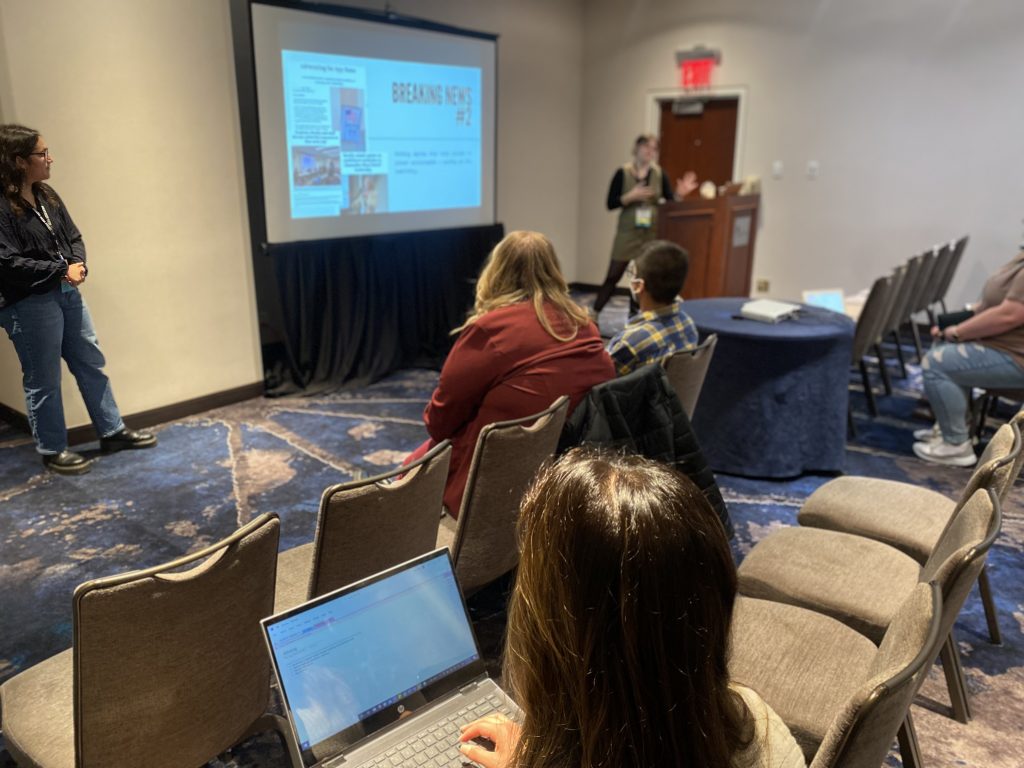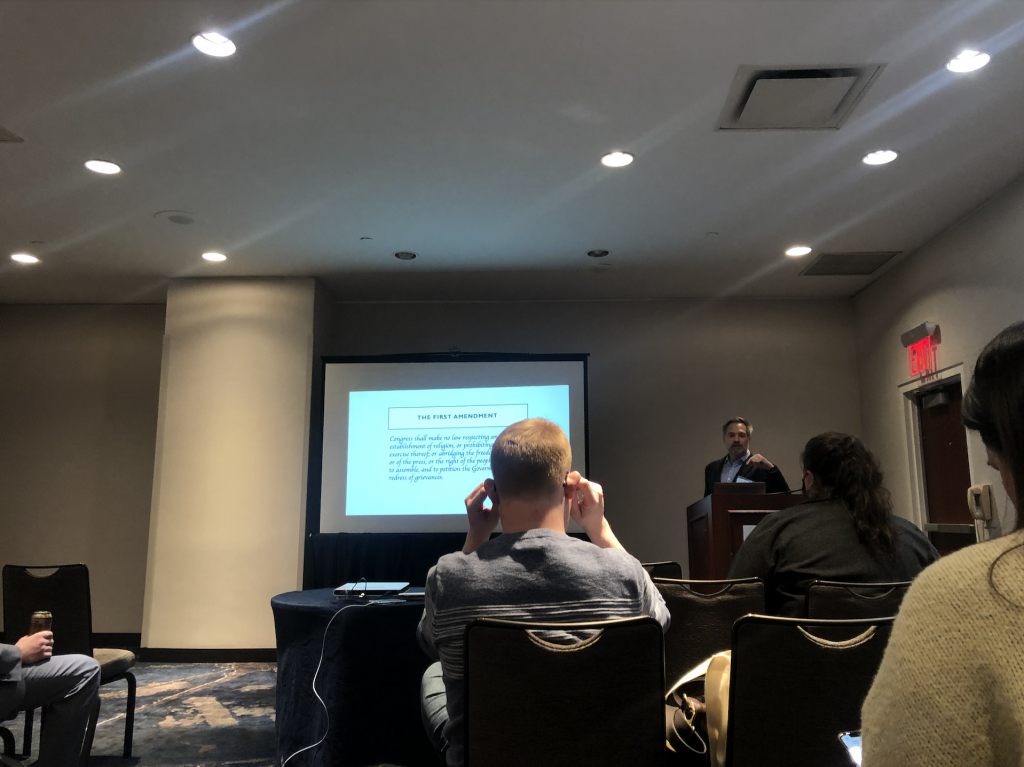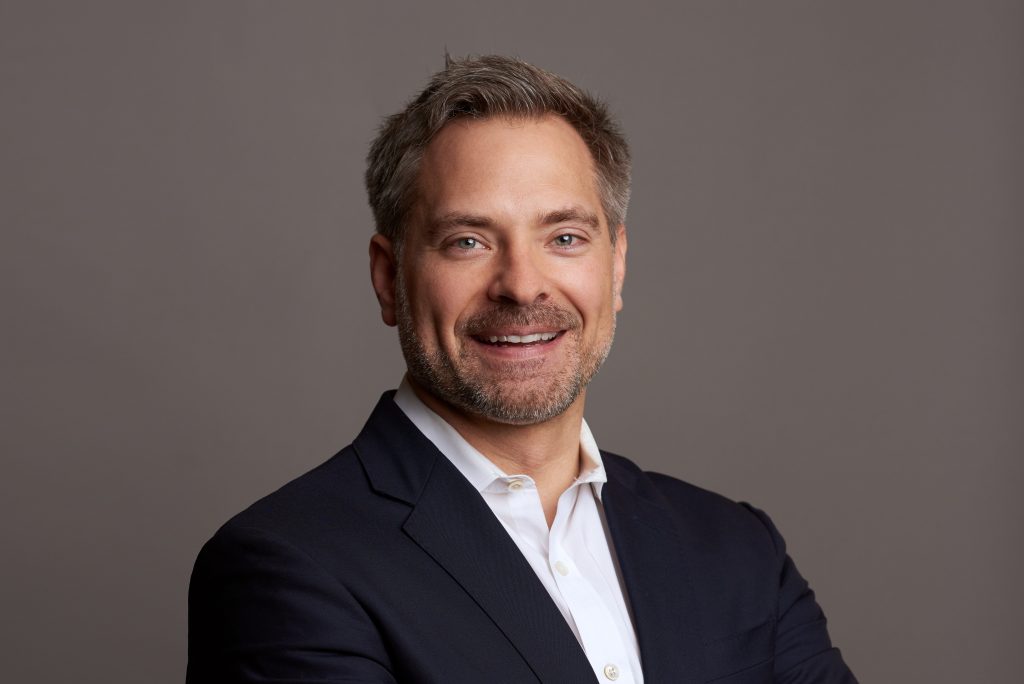Month: March 2022
The importance of diverse news coverage on college campuses

Gabriela Trout Chief copy editor for Appalachian State University, and Emily Broils Editor in chief. Photo by Whitney Thomas
News coverage on university campuses can sometimes fall short where the majority of their news coverage revolves around the university. Emily Broils, the editor-in-chief at Appalachian State University, breaks through this barrier by allowing student journalists to reflect on how they define news, and helping them realize the value breaking news has to them. Balancing breaking news and community news increases readership and credibility to on campus news outlets.
Student journalists can get wrapped up in the misconception that only students are reading the paper and care about their reports, making university news a top priority, and thus can end up forgetting the community around them.
“There was a gunman in my neighborhood, which had never happened before, and my team stood by for hours and ended up gaining respect from law enforcement. They ensured that we got the right information, so we ended up being the first media outlet in my town to break the story,” said Gabriel Trout, the copy editor for Appalachian State university. He emphasized the importance of teaching new students who join media organizations about the importance of news beyond the college campus, because that is where they can experience diverse situations.
Duncan Slade, the editor-in-chief at West Virginia University said he learned that breaking news can easily accelerate. “In the Newsroom it is important to get young reporters more involved with the newsroom process so that they can understand the acceleration of news,” Slade said.
Balancing the life of a student journalist, and student work life can get hectic as you go from class to class. The next story or report is constantly on a journalist’s mind. One of the most important things student journalists learn is the battle between the university and student media can become an unbalanced playing field being that it’s their say vs. yours, where journalists must stand firm in their truth, and always present the facts.
Carrying integrity for the job is another important key factor to being a student journalist. Approaching staff and other sources with empathy and understanding will allow them to be comfortable and transparent. With being at a high level of importance, journalists can sometimes get wrapped up in their egos, but must come to learn that the story and sources are the only important things.
Broils makes an important point saying that getting wrapped up in student media can sometimes back burner school. “I’d get so busy covering stories that I forget about my homework assignments.”
Student journalists should know that the pressure they feel is valid, and that it’s ok to ask for help, and need all hands on deck. Making time for things outside of the newsroom and balancing a life outside of student media is important for mental health reasons.
Deondre Ashley, a current NABJ president for Northwestern University mentioned how he now understands the importance of working with his crew. “Things can get really intense in the news so I now understand that it is important to work with your crew, and be able to relate to them,”
Why Reporting on Religion Matters

By Elena Eberwein
While religion remains a prevalent part of American lives, newsrooms and the stories that come out of them don’t always reflect the faith of the population.
Paul Glader, a journalism professor at The King’s College, spoke in a workshop Thursday afternoon about the challenges journalists face when reporting on religion, why it is important to make sure faith is included and the mission behind his work in creating Religion Unplugged.
A Gallup Poll in 2020 found that church membership in the U.S. is declining for the first time. In 2020, 47% of Americans said they belong to a church. While it’s a decline from previous years, it still makes up a large portion of the population and is important to consider when reporting.
“We don’t live in as much of a religious society as 100 years ago,” Grace McDonald, a junior at the University of Nebraska said. McDonald is a religious person, and said she tries not to bring her bias into her newsroom. When she arrived at the university her freshman year, the higher ups at her school paper didn’t see religious events as newsworthy.
She said over the years it has gotten better as her paper works on diversity and inclusion, and more religious reporters have joined the staff.
Since such a large portion of the U.S. is religious, when reporting it is important not to exclude faith from individuals’ lives, Glader said.
Oftentimes religion is reported on in a negative light. The workshop attendees discussed the reporting of sexual abuse in the Catholic search by the Boston Globe Spotlight team.
“Journalism about sex abuse in the Catholic Church was a service to the Catholic Church,” said Glader. Because of that reporting, offenders could be removed from the clergy.
One workshop attendee said, “People who are predators will seek out opportunities to be predators.” The comment acknowledges that we should write about these individuals as predators, not lumping an entire faith into that category.
Through his work and research on religion, Glader sought out new ways to create bridges with religious reporting and mainstream news outlets. Religion Unplugged was born.
Religion Unplugged is an online news magazine funded by The Media Project that focuses on the topic of religion. Glader is the Executive Editor of the magazine and the site receives over 1 million views a year. The magazine has a weekly podcast, a newsletter and social media presence. Glader said they’re “less sectarian than denominational press.”
The website has won a variety of awards. Glader highlighted one piece about the Mormon church hiding over 100 billion dollars in a secret hedge fund that wound up making national news. The magazine takes pitches from journalists all over the world and of all experience levels.
Paul Glader discusses tips and recommendations to get into the right internships

Paul Glader, program chair and journalism professor at The King’s College in NYC.
By Raul Flores
Program Chair and Journalism Professor at King’s College in NYC, Paul Glader, spoke to students Thursday afternoon about different tips and paths they should be considering when applying and working at potential internships.
Glader has an extensive record of experience in the journalism field, not only has he worked with some of the major news publications such as The Wall Street Journal, The Associated Press and The Washington Post, but he also helps students in King’s College with journalism internship placing.
The session was divided between two parts. Glader dedicated the first half to the tips on how to apply and land internships. He started with basic journalism practices like keeping a record of all your written, published work. Be it a digital archive or a physical clipping of your printed new stories, Glader emphasized its importance.
“The work you do in your newspapers, radio stations, tv stations, saving that work is what will get you the internships.” Glader said.
Glader went into great detail when talking about cover letters and journalistic resumes. He said that a good cover letter will be more creative, even more emotional, than the traditional one.
According to Glader, when it comes to a journalistic resume, it should be kept simple. No need for long resumes; a one-page, three section resume including experience, education and activities & awards is all you’ll need. Also, Glader stressed the importance of accurate and up-to-date contact information.
He spoke about his experience with rejection, telling students that they should sometimes start small. He elaborated saying that it’s easy to get discouraged when rejected by a major news publication, but learning from that and applying to smaller places can eventually lead you to your desired job.
“Apply to several internships, make lists, assess your abilities, build relationships with editors,” Glader wrote in his presentation.
For the second half, Glader gave advice on what to do when finally getting that internship. He gave basic tips such as dressing accordingly to your newsroom’s dress code, constantly communicating with editors and going outside your office for inspiration and story ideas.
Glader said that reading as much as they can is a great learning tool for every writer. He said that they should be reading not only books, but also news outlets they like. He said that curious minds find great story ideas.
He went over the struggles of having too many assignments per week and how to push for only a few memorable stories while serving your editors. With this, Glader also recommended to say yes to stories, opportunities, learning, growth and challenges.
Addressing fears and self-doubt, Glader urged students to take those fears of uncertainty and turn them into a positive work ethic. He said that they should always pursue improvement, asking editors on how to improve work and reading quality journalism.
“Find your own motivations that will help you push through writer’s block” Glader said.
Another tip Glader gave to the audience was the importance of having a variety of skills to show for yourself. He said the aside from writing, there are many skills worth a lot in today’s media landscape; video editing, data journalism, infographics, design and web development were among the mentioned skills.
Glader ended the session by reinforcing the idea that college coursework and published work will help you get into the right places to climb the professional ladder of journalism.
